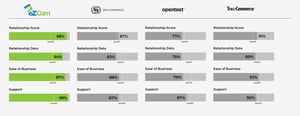Less time processing EDI and online orders. More time for growth.
Back when you first launched your business and started to get orders, your days were filled with excitement and anticipation. You probably didn’t give much thought to how much time it was taking to process EDI and online orders — you were elated to have them. After all, orders meant that people wanted your stuff and you were growing. The last thing you were going to do was complain about the time you spent managing the orders you were so happy to have.
But, in 2019, juggling the needs of your business with the requirements of EDI and the expanding scope of order management is a difficult balancing act. Multiple channels, varying retailer requirements and standards, drop shipping demands, direct-to-consumer sales on your own eCommerce store — the list of variables keeps getting longer and the order process grows ever more complex.
The good news is that you can take steps to make sure EDI and online order management consume less of your time. As you grow, it becomes increasingly important to keep your focus on the overall goals of your company and make sure that getting orders out happens as efficiently and with as much automation as possible. It’s a challenge to get orders and grow a business — getting bogged down in the mechanics of processing transactions is a drain that can sap time and energy from you and your most important people.
EDI done right.
If you have a new brand in today's multichannel retail environment, your path forward may go something like this.
You launch with an eCommerce store on your own web site. At first, sales come slowly but you make smart use of social media and internet advertising. An Instagram influencer shows some love for your brand and a major media outlet runs a story that captures attention. Suddenly, your products are hot and sales are growing in a hurry. Major national retailers begin calling — they want your products in their stores and their own online stores.
Not only does this attention validate your efforts, it offers the chance for significant growth. Even with the dramatic expansion of online shopping, you realize the size and scope of a major national retailer will put your brand in front of millions of new customers.
But first, those retailers will ask you to meet their EDI standards. And when you investigate EDI, it sounds like a new language — X12, EDI 850, EDI 754, EDI 856 — the list goes on and on. Those are just the numbers. It turns out some of the documents have names, too. What’s more, the first big retailer you work with doesn’t seem to do things like the second one that ordered your product. The learning curve is steep.
You can make EDI easy.
Fact is, you have a choice to make.
You could invest all kinds of time learning the ins-and-outs of EDI, investigating the various requirements of different retailers, and becoming an EDI expert. You might even have other members of your staff work on it.
Or you could not. Instead, you could invest all that time in growing and improving your business.
How do you avoid a deep dive into EDI? By choosing an expert EDI provider with cloud-based software that helps you manage EDI documents as quickly as possible with the smallest drain on valuable human resources.
The key is automation. When manual entry is required and each order needs to be handled separately, the amount of time you’re forced to devote to EDI quickly adds up. Automating tasks and processing orders in batch instead of one at a time will save you minutes on every order. When you have a lot of orders, minutes turn into hours. Lots of hours.
Mistakes are also more likely if you rely on people to do things like cut-and-paste data or create shipping labels by inputting information. When your EDI provider has software with precise validation checks and regularly updated mapping of retailers, you can be confident that you are meeting the requirements of your trading partners. With direct connections to shipping providers, order information is automatically transferred to labels so you can eliminate costly errors. As any supplier knows, returns and chargebacks are about as painful as it gets.
Make online orders part of the same process.
With EDI handled by a reliable provider, your attention can turn back to all those online orders. After all, just because a huge retailer like Nordstrom or Home Depot or Bed Bath & Beyond put your product on their shelves doesn’t mean your online sales are coming in more slowly. In fact, they’re probably increasing because of the new exposure.
Sure, there’s your own eCommerce store, powered by Shopify, Magento, WooCommerce, or another company you rely on for that part of your business. But you haven’t ignored online marketplaces, and maybe your product is selling quite nicely in your Amazon store or on Walmart Marketplace.
Retail is now an omnichannel world. But while an order can come from an online marketplace, an eCommerce store, or from a traditional retailer with EDI standards, you’ll save all kinds of time if you process all of them through the same software. Rather than pigeonhole a provider as an EDI specialist or an online order processor, look for a complete system that can handle all of it.
Integrate orders with your ERP or QuickBooks.
Finally, when you are enjoying serious growth and your business has scaled, it may be time to integrate EDI and order processing into the system that powers your business. That could be an ERP like NetSuite, accounting software such as QuickBooks, WMS, or a 3PL provider.
Again, it’s all about automation and the seamless merging of information. When order data is transferred into an ERP like NetSuite without errors, you gain more accuracy and control. Inventory and orders are synced, invoicing can be done in a timely fashion, and your company simply runs more smoothly.
Integration of EDI and order management, however, requires a provider with the experience and the development team that can make it happen. Every company has workflows that are different — it is vital that integration of EDI and order management is tailored to the needs of yours. A clunky integration will end up costing you both time and money.
More time for selling.
While orders are the lifeblood of your company, managing EDI and online transactions takes your focus off your business. When it’s not done well, your supply chain breaks down and it steals valuable time from you.
Fact is, the hours you spend on your business have significant value. They’re often the most precious commodity you have. Treat them that way. If you’ve built a successful business, it is because you made a personal investment in it — emotional, intellectual, financial. Don’t be distracted by EDI and order management just as you start to experience real success.
Do some research about providers of EDI and online order management software. Consider their technological expertise, their culture, and their platform. Is it robust and intuitive? Will it scale as you grow? Are they truly ivested in your success?
Find a provider that fits your company now and in the future. When you make the right choice, you’ll get back the time you need to focus on the business you love.






